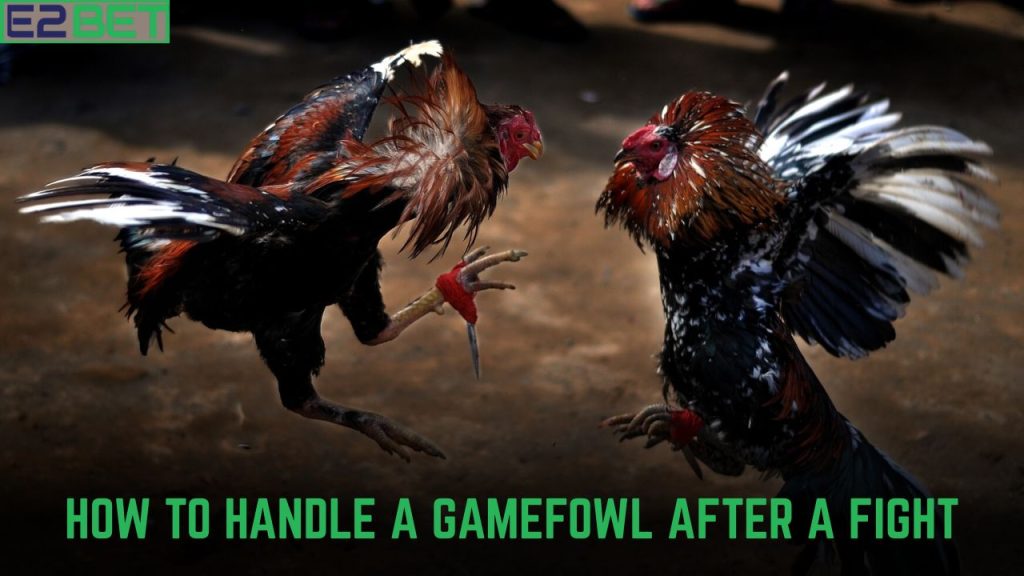Understanding how to manage a gamefowl after a fight is essential for every sabungero, handler, or breeder. A match tests the limits of a bird’s physical and mental strength, and what happens afterward can make or break its future in the pit. This guide offers a comprehensive, step-by-step system to ensure your gamefowl after a fight receives the care, rest, and nutrition it needs to recover and rise again.
Table of Contents
Step 1: Immediate Cleaning and Initial Check-Up
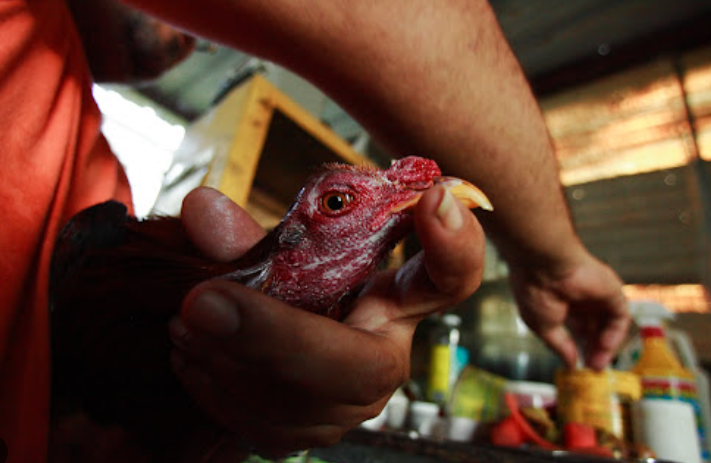
The first and most crucial part of handling a gamefowl after a fight is to calm and cleanse the bird right after the match. During the battle, the bird accumulates dirt, sweat, blood, and trauma—all of which must be addressed immediately.
Begin by gently washing your gamefowl after a fight with lukewarm water to remove debris. Use mild antiseptic soap or Betadine to clean wounds carefully, especially around the face, neck, chest, and under the wings—common injury zones. Avoid scrubbing or applying strong water pressure. Pat the bird dry with a soft towel to prevent chills.
Cleansing a gamefowl after a fight not only prevents infection but also exposes any hidden cuts, making it easier to assess the full extent of damage for proper treatment.
Actions:
- Gently rinse the bird with lukewarm clean water to wash away blood, dirt, sweat, and other residues.
- Use mild antiseptic soap or povidone-iodine solution (Betadine) to clean visible wounds.
- Avoid strong pressure; gently pat dry the feathers with a clean towel.
- Focus on face, neck, breast, under the wings, and legs, where most injuries occur.
Why it matters:
This prevents bacterial infection, allows you to clearly see the wounds, and helps cool down the bird’s body temperature after intense physical activity.
Step 2: Wound Treatment and Bleeding Control
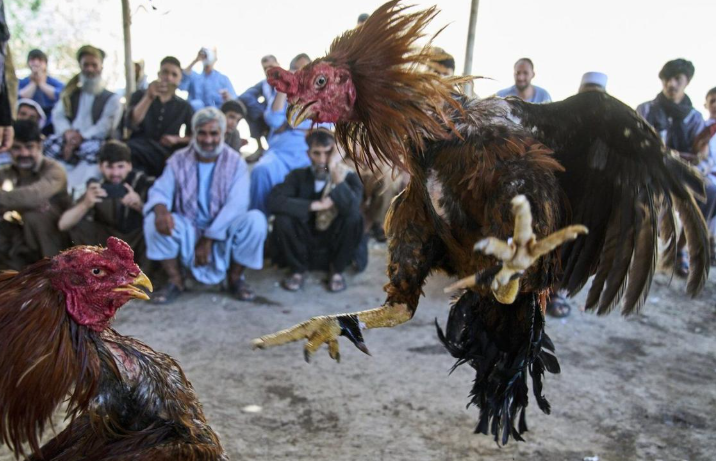
Proper wound care is a vital step in nursing a gamefowl after a fight back to health. This includes identifying open wounds, internal injuries, and treating bruises or broken body parts.
For minor bleeding, apply styptic powder, turmeric paste, or cornstarch. When caring for a gamefowl after a fight, it’s important to disinfect any wounds using topical antibiotics like neomycin or natural remedies such as crushed guava leaves. Also, examine the eyes, beak, and legs for trauma—many gamefowl after a fight suffer from swollen eyelids, blood clots, or fractured spurs that require immediate attention.
Ignoring signs of infection or internal damage could endanger the life of a gamefowl after a fight, so take your time to check for swelling, foul odors, or abnormal behavior like trembling or refusal to eat.
Actions:
- For bleeding wounds, apply styptic powder, turmeric paste, or cornstarch to help clot the blood.
- For cuts or scratches, apply topical antibiotics such as neomycin ointment or natural herbal salves like crushed guava leaves.
- Check the eyes and mouth for blood clots, broken beaks, or dislocation.
- Trim broken feathers or damaged spurs if necessary.
Watch out for:
- Swelling, pus, or foul odor = sign of infection
- Shaking, staggering, or no appetite = possible concussion or internal trauma
Step 3: Isolation and Comfortable Recovery Space
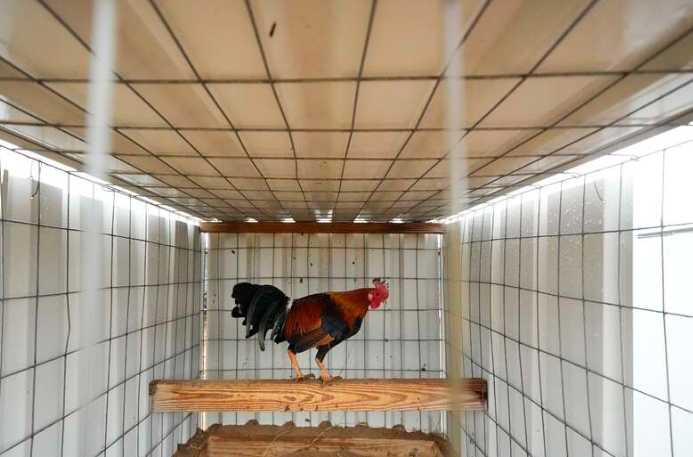
After treating visible injuries, the next step in managing a gamefowl after a fight is ensuring it rests in a clean, safe, and quiet environment. Stress and overexertion worsen recovery, so isolation is key.
Relocate the gamefowl after a fight to a shaded pen or recovery coop with soft bedding such as dry straw or rice hulls. This prevents further injury from rough surfaces. Keep the area warm and ventilated, and avoid contact with other birds or loud noises.
Allow the gamefowl after a fight to rest for at least 3 to 7 days depending on the severity of its wounds. For birds that suffered heavy trauma, recovery may require 2–3 weeks. During this period, minimal handling and a calm setting are crucial to avoid further stress.
Actions:
- Transfer to a clean, quiet, and shaded pen or recovery coop with soft bedding (dry straw or rice hulls).
- Ensure proper airflow but keep the bird warm—a stressed bird is vulnerable to cold.
- Limit movement and avoid handling unless necessary.
Rest time:
Allow 3–7 days of full rest. For serious wounds, up to 2–3 weeks or until signs of full recovery are seen.
Step 4: Nutrition and Hydration for Healing
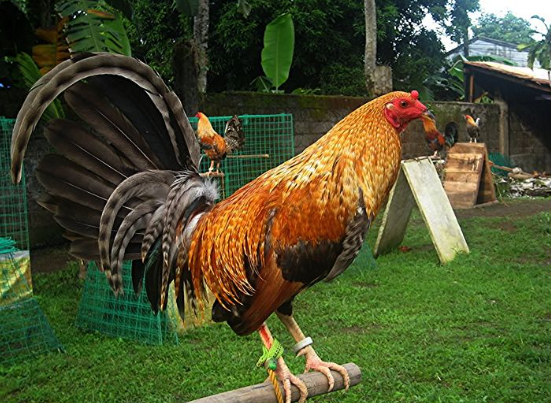
Feeding your gamefowl after a fight the right way can significantly speed up its recovery process. After a high-intensity match, a bird’s energy reserves are depleted and its immune system is vulnerable.
Begin by offering clean water mixed with electrolytes or glucose. Then, feed your gamefowl after a fight with soft, high-protein food such as boiled eggs, liver mash, tuna flakes, or special gamefowl recovery feeds. These meals promote tissue repair and muscle regeneration.
Also, provide essential vitamins to support healing in your gamefowl after a fight:
- Vitamin B-complex – helps repair nerve damage
- Vitamin C – boosts immunity and reduces inflammation
- Iron and folic acid – replenishes lost blood
- Probiotics – supports digestion and gut health
Feed small portions more frequently to help your gamefowl after a fight regain strength without overwhelming its system.
Actions:
- Provide clean, fresh water mixed with electrolytes or glucose powder to help replenish fluids.
- Feed easily digestible high-protein foods like:
- Boiled eggs
- Liver mash
- Tuna flakes
- Specialized gamefowl recovery feeds
- Add vitamin supplements such as:
- Vitamin B-complex (for nerve recovery)
- Vitamin C (anti-stress)
- Iron and folic acid (for blood regeneration)
Tip :Feed in small portions more frequently to encourage eating and digestion.
Step 5: Observation, Monitoring, and Mental Recovery
Monitoring behavior and mental recovery is an overlooked but essential part of caring for a gamefowl after a fight. A battle not only affects the body—it can cause psychological trauma.
Observe your gamefowl after a fight daily. Is it alert? Does it eat, walk, and respond to noise normally? Watch for signs of depression, such as drooping wings or prolonged inactivity. If the bird is too quiet or unresponsive, it may still be in pain or emotional shock.
Avoid exposing your gamefowl after a fight to rival cocks or loud, aggressive environments. Soft music or a calm, shaded coop can aid in emotional recovery. Patience is critical—forcing interaction or stimulation too early could undo progress.
Actions:
- Observe behavior: is the bird alert? walking straight? responsive?
- Inspect wounds daily: are they healing? any new swelling or bad smell?
- Avoid sparring or exposing to aggressive stimuli for at least 1–2 weeks.
Encourage calm:
- Soft background sounds or music can soothe stress.
- Do not introduce hens or rival cocks too early—it can reintroduce aggression.
Step 6: Gradual Return to Conditioning
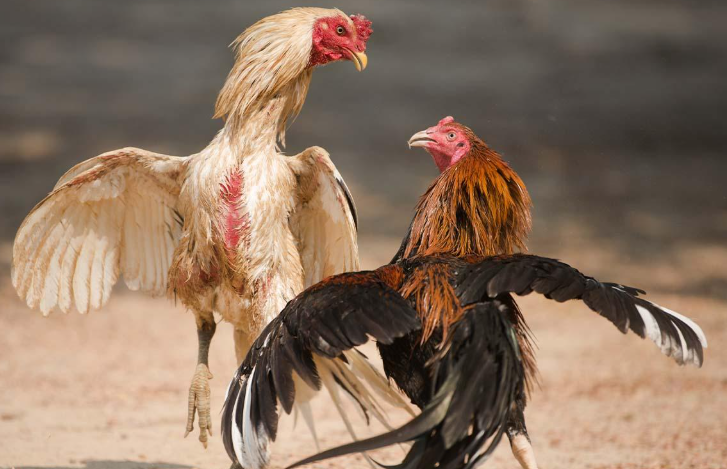
Once your gamefowl after a fight shows no signs of pain, infection, or emotional distress, you can begin gentle reconditioning.
Start with light activities like perch walking, scratching in a clean yard, and flapping exercises under the morning sun. Your gamefowl after a fight must build strength slowly before it returns to serious training or sparring.
Wait until the gamefowl after a fight has fully regrown feathers, regained weight, and shows strong body posture and mental focus. Rushing the bird back into combat risks re-injury or psychological relapse.
The proper reconditioning of a gamefowl after a fight ensures it returns to the pit more skilled, more resilient, and ready to perform at peak capacity.
- Perch walking
- Controlled scratching
- Gentle wing flapping
- Short sun exposure
Avoid sparring or hard training until scars have healed, feathers regrown, and the bird has regained full energy and aggression.
Summary: Best Practices After a Gamefowl Fight
| Task | Description |
|---|---|
| Clean and Disinfect | Rinse with water, clean wounds with antiseptic |
| Treat Injuries | Stop bleeding, apply ointments or natural remedies |
| Isolate and Rest | Keep in a quiet pen with soft bedding for 3–7 days |
| Nutrition and Supplements | Give protein-rich food and vitamins B, C, and iron |
| Monitor Recovery | Observe behavior and wound healing; avoid stress |
| Return to Training Gradually | Light movement only after full recovery; no sparring too soon |
Read more:-
- Cockfighting in the Philippines: Inside a Billion-Dollar Tradition of Blood, Belief, and Business
- World Slasher Cup Champions: Gamefowl Bloodlines That Win Fights
FAQs about handling a gamefowl after a fight:
1.. How soon should I treat a gamefowl after a fight?
Immediately. The first 30 minutes are crucial to clean wounds, stop bleeding, and prevent infection in a gamefowl after a fight.
2.Can I let my gamefowl after a fight interact with other birds?
No. Always isolate your gamefowl after a fight to avoid stress, aggression, or wound reopening during recovery.
3.What should I feed my gamefowl after a fight?
Provide high-protein soft foods (boiled eggs, liver, tuna) and water with electrolytes and vitamins to help your gamefowl after a fight heal faster.
